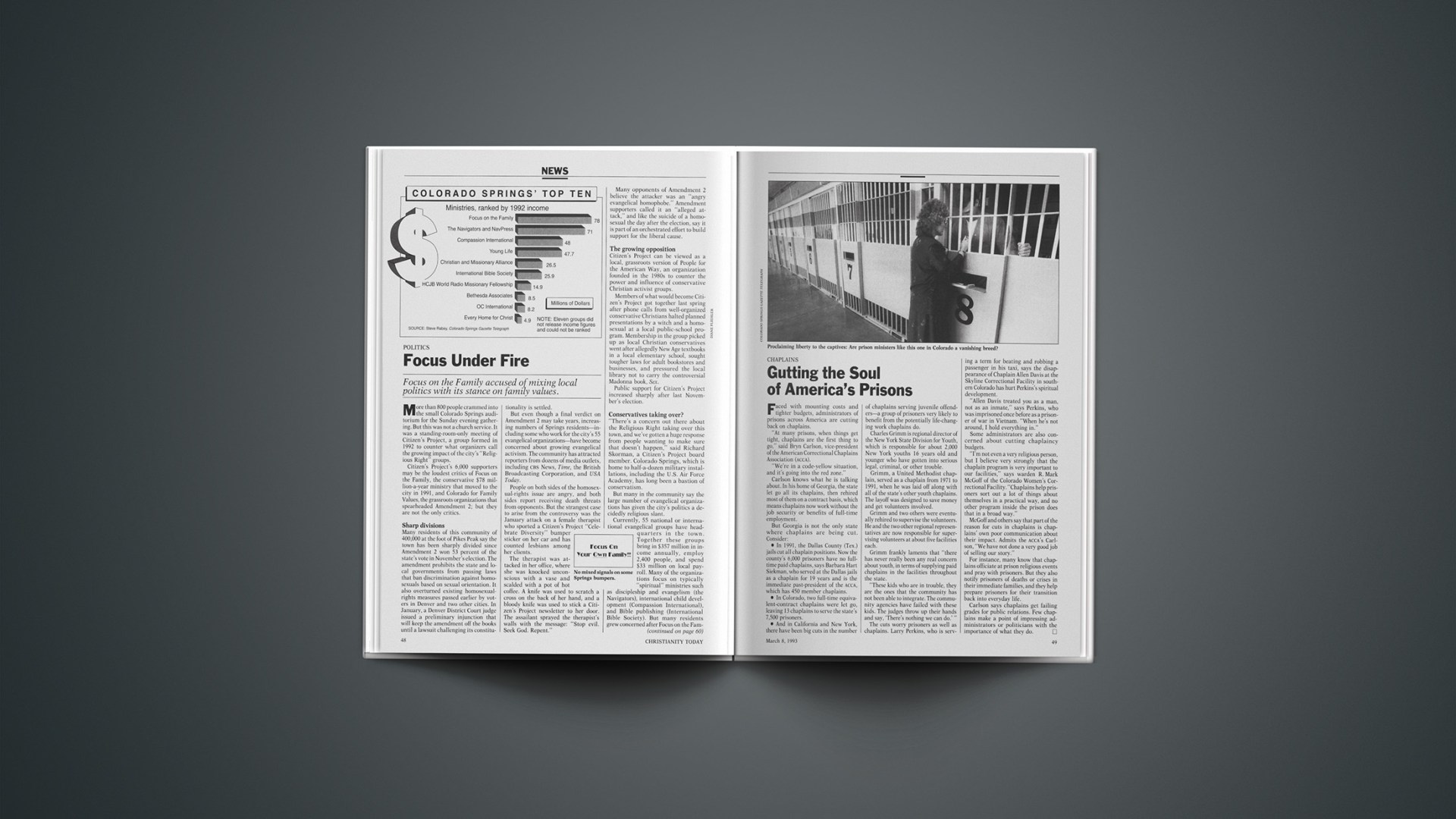Faced with mounting costs and tighter budgets, administrators of prisons across America are cutting back on chaplains.
“At many prisons, when things get tight, chaplains are the first thing to go,” said Bryn Carlson, vice-president of the American Correctional Chaplains Association (ACCA).
“We’re in a code-yellow situation, and it’s going into the red zone.”
Carlson knows what he is talking about. In his home of Georgia, the state let go all its chaplains, then rehired most of them on a contract basis, which means chaplains now work without the job security or benefits of full-time employment.
But Georgia is not the only state where chaplains are being cut. Consider:
• In 1991, the Dallas County (Tex.) jails cut all chaplain positions. Now the county’s 6,000 prisoners have no full-time paid chaplains, says Barbara Hart Siekman, who served at the Dallas jails as a chaplain for 19 years and is the immediate past-president of the ACCA, which has 450 member chaplains.
• In Colorado, two full-time equivalent-contract chaplains were let go, leaving 13 chaplains to serve the state’s 7,500 prisoners.
• And in California and New York, there have been big cuts in the number of chaplains serving juvenile offenders—a group of prisoners very likely to benefit from the potentially life-changing work chaplains do.
Charles Grimm is regional director of the New York State Division for Youth, which is responsible for about 2,000 New York youths 16 years old and younger who have gotten into serious legal, criminal, or other trouble.
Grimm, a United Methodist chaplain, served as a chaplain from 1971 to 1991, when he was laid off along with all of the state’s other youth chaplains. The layoff was designed to save money and get volunteers involved.
Grimm and two others were eventually rehired to supervise the volunteers. He and the two other regional representatives are now responsible for supervising volunteers at about five facilities each.
Grimm frankly laments that “there has never really been any real concern about youth, in terms of supplying paid chaplains in the facilities throughout the state.
“These kids who are in trouble, they are the ones that the community has not been able to integrate. The community agencies have failed with these kids. The judges throw up their hands and say, ‘There’s nothing we can do.’ ”
The cuts worry prisoners as well as chaplains. Larry Perkins, who is serving a term for beating and robbing a passenger in his taxi, says the disappearance of Chaplain Allen Davis at the Skyline Correctional Facility in southern Colorado has hurt Perkins’s spiritual development.
“Allen Davis treated you as a man, not as an inmate,” says Perkins, who was imprisoned once before as a prisoner of war in Vietnam. “When he’s not around, I hold everything in.”
Some administrators are also concerned about cutting chaplaincy budgets.
“I’m not even a very religious person, but I believe very strongly that the chaplain program is very important to our facilities,” says warden R. Mark McGoff of the Colorado Women’s Correctional Facility. “Chaplains help prisoners sort out a lot of things about themselves in a practical way, and no other program inside the prison does that in a broad way.”
McGoff and others say that part of the reason for cuts in chaplains is chaplains’ own poor communication about their impact. Admits the ACCA’s Carlson, “We have not done a very good job of selling our story.”
For instance, many know that chaplains officiate at prison religious events and pray with prisoners. But they also notify prisoners of deaths or crises in their immediate families, and they help prepare prisoners for their transition back into everyday life.
Carlson says chaplains get failing grades for public relations. Few chaplains make a point of impressing administrators or politicians with the importance of what they do.










